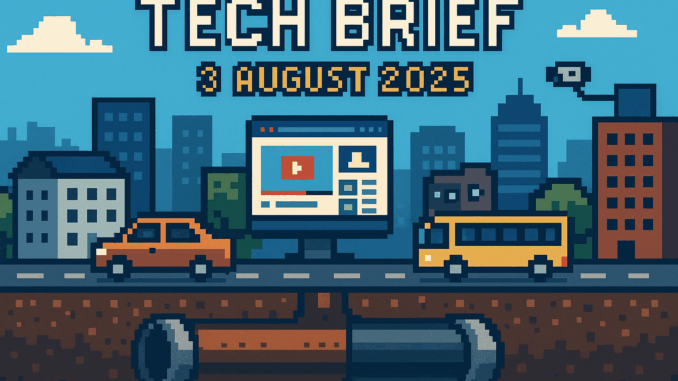
Tech Brief 3 August 2025 brings you a cross-section of today’s most urgent technology stories, from the revival of classic British engineering to the shifting sands of digital media and public surveillance. If you want a reason to care about pipebursting, spreadsheets, or the fate of traditional telly, you’re in the right place. Missed yesterday’s Tech Brief? Catch up here before diving in.
Trenchless Pipebursting Returns as AMP8 Drives Infrastructure Upgrades
“Why rip up the road if you can slip a new pipe under it?” That question is driving the comeback of pipebursting technology across UK water utilities. With Ofwat’s AMP8 regulatory period in full swing, the TRACTO GRUNDOBURST system, originally devised for British Gas and Severn Trent Water in the late 1970s, is back in high demand. Utilities now face pressure to replace ageing water mains without the chaos of open trenches.
This revival is not just about nostalgia for clever British engineering. It is practical: fewer traffic jams, less disruption, and a nod to the resourcefulness that defined late 20th century infrastructure. Manuals from the era flagged trenchless methods as revolutionary, but it took regulatory muscle to make them mainstream. Today, the same rugged kit is proving that sometimes the simplest solution is the best, especially when paired with modern project data and sensors.
Older UK Viewers Ditch the BBC for YouTube’s Niche Comforts
A cold fact: Ofcom reports that viewers over 55 in the UK watched nearly twice as much YouTube in 2024 as in 2023, with 42 percent now streaming on their TVs. Six over-50s told The Guardian why they’re swapping familiar BBC fare for YouTube’s buffet of short, quirky, and personal content.
It is not just about novelty. Many are chasing the freedom and specificity that TV schedules never truly offered. For anyone who remembers Teletext or the thrill of taping late-night shows, this shift feels almost inevitable. The same generation that once programmed VCRs and swapped mixtapes is now curating their own digital viewing schedules, one algorithmic rabbit hole at a time. The BBC, for all its legacy, simply cannot compete with the immediacy and personality of a well-chosen YouTube channel.
Met Police Doubles Down on Facial Recognition as Budgets Shrink
What do you do when you lose 1,700 officers and staff? If you’re the Metropolitan Police, you deploy more live facial recognition cameras. The Met’s latest move marks a significant shift towards automated surveillance, as human resources dwindle and the pressure to maintain public safety grows.
Facial recognition, once a sci-fi staple, is now everyday kit in London’s security arsenal. The technology is controversial: privacy groups warn of errors and bias, while supporters argue it is a force multiplier. Back in the 1990s, CCTV was new and unsettling. Today, the debate is about who, or what, is doing the watching. Sophie’s Note: It is hard not to think of Judge Dredd when reading these stories, but the implications are real and immediate for anyone who remembers the early days of public surveillance.
Spreadsheet Champions: When Excel Becomes a Competitive Sport
Here is a contradiction: Excel, the office workhorse we love to groan about, now has its own esports scene. “Spreadsheet Champions,” a new documentary, follows six competitors to the Microsoft Office Specialist world championship in Florida. Melbourne filmmaker Kristina Kraskov reveals a world of lightning-fast formulas, tense showdowns, and a surprising cult of personality around spreadsheet mastery.
Not everyone sees the appeal, but for those who recall the thrill of coaxing a Lotus 1-2-3 macro into submission or building a budget on a BBC Micro, there is a strange satisfaction in seeing spreadsheets take centre stage. The film treats its subject with affection rather than irony, showing that even the most mundane tools can inspire obsession, rivalry, and genuine skill. The next time someone calls Excel boring, just point them to this unlikely sporting arena.
From the Wayback Machine
On This Day: 1977 – Tandy/Radio Shack launched the TRS-80 Model I, marking a turning point for affordable home computing. The TRS-80, designed by Steve Leininger and Don French, offered a Zilog Z80 processor, 4 KB RAM, and cassette storage, all for $399 (£325). Unlike earlier kits, it was ready-built and sold through Radio Shack’s thousands of stores, making personal computing accessible to a wider public. The TRS-80’s success helped define the “1977 Trinity,” alongside the Apple II and Commodore PET, shaping the landscape for decades.
What This Means
Today’s Tech Brief 3 August 2025 is a reminder that old ideas do not disappear, they adapt. From pipebursting’s second act to spreadsheets as sport, the past keeps resurfacing in new forms. The only constant is change, and the need to stay curious, sceptical, and occasionally nostalgic.
Take a moment to notice which stories spark your own memories. The future is always built on what we quietly refuse to forget.
Missed yesterday’s Tech Brief? Catch up here

Leave a Reply